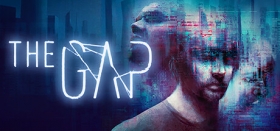
The Gap Review
There are many terrible things we as humans can face on a day-to-day basis. One subject that developer Label This has focused on for The Gap is seeing loved ones succumbing to illness and being powerless to stop it. Although the subject matter may be too much for some, is this narrative-driven experience one worth embarking on, and is there light at the end of this tunnel full of multiverses and puzzles for our protagonist?

The Gap opens with our main character, Joshua Hayes, who is desperately pleading with his wife, Amber, not to leave with their daughter. Why are they leaving? Perhaps due to the fact that Joshua seems hell-bent on solving an as yet unknown issue, repeating things such as “I’m this close, Amber, I swear” and “I just need a couple more weeks”, which has caused him to focus entirely on his work, shutting out his family completely.
But what made him go from loving father and husband to a workaholic? Well, it’s his love for this family that's driven him to this obsession, as they are afflicted by a rare neurological disease that slowly eats away at their mental well-being and capacity to function. As an esteemed neuroscientist, Joshua thinks he can find a cure and return to an ordinary life with his wife and daughter.
Adamant that he is about to reach a turning point with his research, Joshua turns to an old friend, Chris, and signs onto the obviously sinister corporation that Chris works for. With powerful technology behind him, our leading man can revisit memories of his past simply by looking at specific photos or objects, which may well lead to an answer for the disease plaguing his family. What follows is a literal journey through Joshua’s memories, and whilst going into further detail would naturally result in huge spoilers for a narrative-driven game, The Gap is a thought-provoking tale of one man’s desperation to help his loved ones by any means necessary.

I really liked not just the visuals of The Gap but its overall aesthetic. Exploring not only Joshua’s home but his various memories, all featuring small details that help build this world set in the not-too-distant future. The environments convey a sense of mystery that compelled me to learn more. Things like the control panel on the front door that indicates the dangerous air quality outside or the foreboding signs spray-painted around Joshua’s apartment don’t do much to impact the overall story, but are definitely intriguing factors that left me with many questions to try and resolve.
The Gap makes clever use of silence during Joshua’s solitary journey, which really emphasises just how alone he is on his quest. There is music and background noise interspersed throughout the game — mainly when you’re inside alternative realities and memories — but for the most part, it’s just Joshua and his dejected inner monologue to keep him company, which leads us to the voice acting. Whilst coming across as a bit hammy on the odd occasion, this is mostly written and acted very well, and convincingly shows players the amount of turmoil and distress Joshua is in during his more painful memories and thoughts.

In its most basic form, The Gap is essentially a walking simulator. Although this may deter some gamers from giving it a go, think of titles like What Remains of Edith Finch and Firewatch as reminders of just how enthralling the genre can be. It’s more than simply wandering from one area to the next, as you’ll be constantly hopping in and out of parallel realities, returning only when you’ve located the clue to a puzzle in a separate memory.
You’ll explore the various memories and places of Joshua’s past, interacting with practically anything that’s highlighted in the hopes of finding a way to drive the story forward. Its simple control scheme means players only ever need to walk, look, and interact with objects (as well as exit out of a memory to return to the present should you be unable to solve a puzzle) and though the lack of a fast walk button can cause some backtracking to grow a little tiresome, the areas aren’t overly-large to begin with.
The puzzles themselves never become Discworld levels of difficult (or frustrating), though they can nonetheless stump you if you’re not paying close enough attention to what’s being said or to the surrounding environments. These are almost always solved by entering another reality or memory, finding the information, and returning to complete the puzzle. I would have liked to have seen a few more complexities when it came to these, as, more often than not, just exploring until you find a highlighted object will lead to finding the answers.
Clocking in at around five hours, The Gap doesn’t outstay its welcome, as with limited controls and only so much to explore, it did run the risk of becoming monotonous. Thankfully, then, this compact — yet compelling and powerful — narrative never lost focus, always striving towards the game's closing chapter (unless a puzzle has you stumped) that features multiple endings. Whilst some of the dialogue and recurring themes may be difficult for certain gamers, there’s no doubt that The Gap is a well-told tale of one man overcoming his inner demons to save — and ultimately reunite — with his loved ones.
The Gap (Reviewed on PlayStation 5)
This game is good, with a few negatives.
The Gap has a compelling and sombre narrative and an interesting premise that will appeal to fans of slow-burning mysteries. Whilst the puzzles could have been slightly more complex, this short game of one man's quest to save his loved ones is still a tale worth experiencing.










COMMENTS